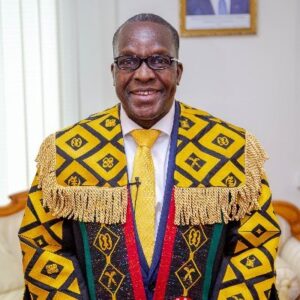Expert: Delay In MMDCE Appointments Impedes Local Governance

The delay in appointing Metropolitan, Municipal, and District Chief Executives (MMDCEs) is severely disrupting the operations of local governance across Ghana, according to Dr. Richard Fiadamor, a respected local governance expert. The absence of these key figures in local government is having far-reaching consequences, particularly within the 261 Metropolitan, Municipal, and District Assemblies (MMDAs). Dr. Fiadamor, who is also the President of the Chamber for Local Governance, explained that the delay has effectively paralyzed the legislative and administrative functions of the assemblies, ultimately hindering the delivery of critical services to residents.
Dr. Fiadamor elaborated on the implications of the delay in an interview with the Daily Graphic, highlighting that MMDCEs play a vital role as the President’s representatives at the local level. They oversee the day-to-day administration of the MMDAs and chair the Executive Committees, which are responsible for approving reports and convening General Assembly meetings. Without appointed MMDCEs, these essential tasks cannot be carried out, which means that assembly members are unable to execute their legislative duties effectively. As a result, sub-committees and general assemblies cannot convene to make vital decisions, such as formulating policies or passing by-laws that are crucial to local governance.
The ongoing uncertainty surrounding the appointment of MMDCEs has also led to anxiety and speculation among various stakeholders, including local government officials, traditional leaders, and the general public. While sources close to the ruling National Democratic Congress (NDC) party have indicated that the appointment process is underway, no formal announcement has been made yet. This has left many people in limbo, including those who have undergone interviews for the position in regional capitals and are now awaiting their appointments. However, some supporters of the ruling party have voiced their concerns about the delay, arguing that it is negatively impacting the operations of the local assemblies and preventing the effective administration of services at the grassroots level.
Dr. Fiadamor pointed out that another major concern resulting from the delay is the absence of MMDCEs in their roles as chairpersons of the Metropolitan, Municipal, and District Security Committees. These committees are critical in coordinating the activities of local security agencies, such as the police and military, to maintain law and order within the districts. In the absence of MMDCEs, there is no one in the position of authority to oversee the security situation, which could lead to inefficiencies in addressing security challenges in local communities.
Additionally, the delay is having a negative impact on the renewal of contracts for ongoing projects, as well as the initiation of new development projects. MMDCEs play a pivotal role as the chairpersons of the Tender Committees in the MMDAs, and without their appointments, the assemblies cannot approve new projects or renew existing contracts. This stagnation in project execution hampers the growth and development of local communities, leaving residents without much-needed infrastructure, services, and resources.
The situation is further compounded by the fact that the Ministry of Local Government, Chieftaincy, and Religious Affairs has yet to make an official statement on the delays. Sources indicate that the appointment process is ongoing, and an announcement will be made in due course. However, the lack of clear communication from the Ministry has only fueled further uncertainty, leaving stakeholders in suspense and wondering when the appointments will finally be finalized.
This delay in appointing MMDCEs follows President John Dramani Mahama’s decision on January 8, 2025, to revoke the appointments of all MMDCEs who were appointed under the previous administration. The revocation, which was communicated in a letter signed by Dr. Callistus Mahama, the Secretary to the President, was made in line with the powers granted to the President under the Local Government Act of 2016 (Act 936) and its amendment in 2017 (Act 940). According to the 1992 Constitution, the President has the authority to appoint MMDCEs, although these appointments must be approved by the respective local assembly members.
In conclusion, the delay in appointing MMDCEs is having a significant and detrimental impact on local governance in Ghana. The failure to appoint these key officials has paralyzed the operations of the MMDAs, affecting everything from legislative functions to security coordination and infrastructure development. While the appointment process is reportedly ongoing, the lack of clarity and official communication is adding to the frustration of stakeholders. Local governance experts like Dr. Fiadamor stress the need for swift action to resolve the issue and restore effective governance at the local level.







